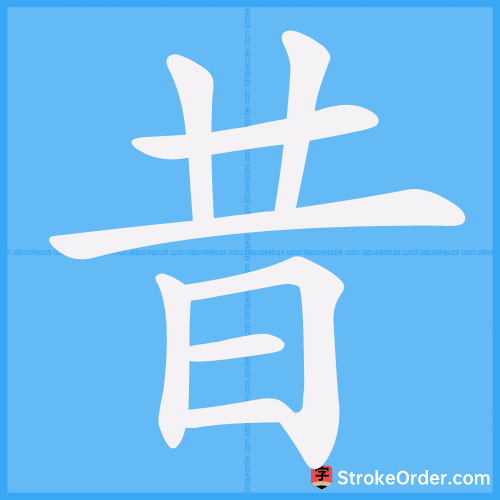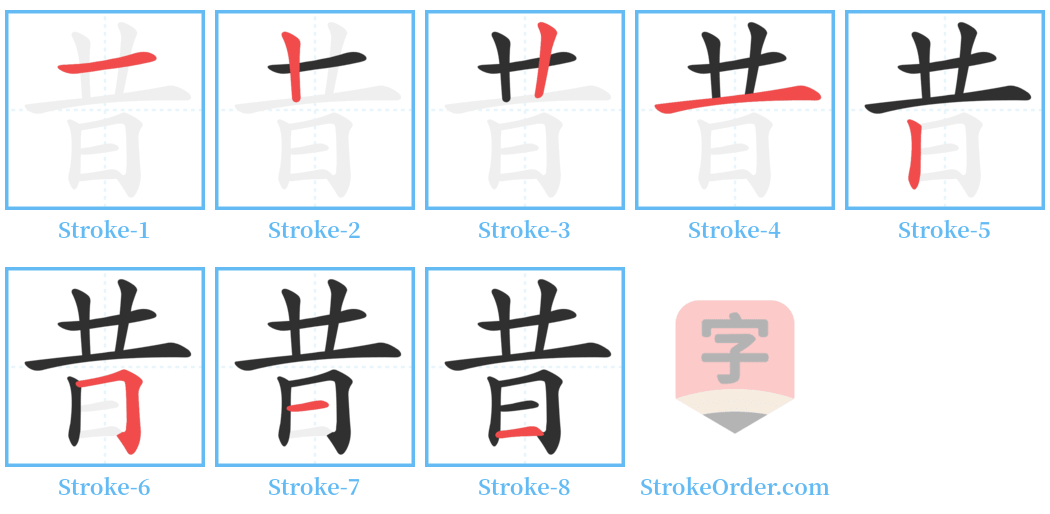昔 Stroke Order
Animated Stroke Order of 昔

Stroke Order Diagrams for 昔

Step-by-Step Handwriting Guide for 昔

Learn to Write Chinese Characters with Video Tutorials
Watch the video of writing the Chinese character "昔", learn the correct stroke order (笔顺) of the character "昔", and master the standard way of writing the character "昔".
Free Printable Handwriting Practice with Stroke Order: 昔
Printable Writing Practice Worksheet of "昔" in Portrait Orientation (Tian Zi Ge)

Printable Writing Practice Worksheet of "昔" in Landscape Orientation (Tian Zi Ge)

Information of 昔
Pinyin
xī
Radical
日
Strokes
8 strokes
Usage
★★★★★
Definition
past / former
昔 [xī]
Noun
1. Formerly; in the past. Example: 旧者 (those from former times); 往昔 (in past times); 今昔对比 (comparison of past and present).
2. Same as "夕" (evening); night.
昔 [xī]
Noun
1. Formerly; in the past. Example: 昔者 (those from former times); 昔人 (people from the past); 往昔 (in past times); 今昔对比 (comparison of past and present).
2. Same as "夕" (evening); night.
1. Original meaning: dried meat.
2. Abbreviated to mean "yesterday"; refers to the past (in contrast with "now").
3. Yesterday.
4. Dusk; evening.
5. Same as "夕" (evening).
引:
1. "说文": 昔, 干肉也 (In "Shuowen", it says: 昔 means dried meat).
2. Abbreviated to mean "昨" (yesterday) from the past (in contrast with "now"). Example from "周礼": 昔酒; Example from "书": 昔之人无闻知; Example from "诗": 自古在昔.
3. Yesterday. Example from "孟子": 昔者疾, 今日愈, 如之何不吊? (In "Mencius": back then I was ill, today I am better, how can I not mourn?)
4. Dusk. Example from "庄子": 是今日适越而昔至也 (In "Zhuangzi": today's situation also arrived with dusk).
5. Evening. Example from "庄子": 通昔不寐矣 (In "Zhuangzi": cannot sleep through the night).
形
1. Past; former. Example: "昔日" (in days of old).
名
1. Evening. Example from "左传": 为一昔之期 (In "Zuo's Commentary": for a period of a night).
2. Surname. Example: there were people named 昔 in the Han dynasty.
形
1. Rough. Example from "周礼": 老牛之角紾而昔 (In "Zhou Li": the old cow's horn twisted and became rough).
Input Method for 昔
Pinyin
xi1
Wubi
ajf
Cangjie
ta
Zhengma
eak
Four Corner
44601
Unicode
U+6614
Same Pronunciation Characters